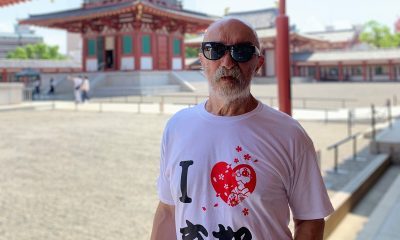Local
Gay Games ousts organizer, but event stays in Cleveland
Some say decision violates rules, event should move to D.C.

The international LGBT sports organization that picked Cleveland over D.C. to host the 2014 Gay Games announced Tuesday that it has revoked its contract with the Cleveland foundation it chose to organize the games.
And in an action questioned by D.C. sports groups, the Federation of Gay Games also said it “remains committed” to keeping the quadrennial event in Cleveland, even though some people believe its rules call for awarding the games to the organization and city whose bid it selected as the runner up.
The FGG selected the Metropolitan Washington Gaymes, Inc., a coalition of D.C.-area LGBT sports groups, as the runner up for the games last year, when it announced it had picked the Cleveland Synergy Foundation as the host for the 2014 event in Cleveland.
“As the runner up city, we expressed our hope that they would follow what we’ve interpreted as the accepted procedure, which is if the contract could not be executed [in Cleveland] they would go to the runner up,” said Brent Minor, president of Team D.C., one of the LGBT sports organizations that’s part of Metropolitan Washington Gaymes.
“So this is news to us,” Minor said. “It’s very disappointing.”
Minor and Vince Micone, president of Metropolitan Washington Gaymes, said the Gaymes group would consider whether to question the decision and possibly seek to reverse it when the FGG General Assembly meets in Cologne, Germany later this month.
The General Assembly is the organization’s full governing body and can overrule action by the FGG board, which is believed to have made the decision to stick with Cleveland for the 2014 Gay Games.
The General Assembly meeting is set to take place after the 2010 Gay Games, now being held in Cologne, concludes Aug. 7.
But Kelly Stevens, a member of the FGG board and spokesperson for the organization, issued a statement from Cologne disputing Minor and Micone’s interpretation of the rules related to runner up status.
“The site selection rules were set up to provide a process in case an original license agreement with a host city could not be reached,” he told the Blade. “They are not written to award the games to another city in case of change of management once planning has begun. The FGG will honor the vote for Cleveland as the host of the 2014 Gay Games.
“Naturally, the FGG will discuss the situation at its annual meeting,” he said. “We will not be issuing any further comments. Our time [now] is devoted to Cologne.”
In announcing its decision to oust the Cleveland Synergy Foundation as the Gay Games organizing entity, the FGG reversed an announcement one week earlier saying it would not disclose its decision on the Synergy Foundation until after the General Assembly meeting.
The decision to revoke Synergy’s license didn’t come as a surprise to Gay Games observers, who have read reports coming from Cleveland about the FGG’s and Cleveland city officials’ dissatisfaction with the foundation. Some press reports have noted Synergy faced problems related to financial “irregularities.”
An official with Cleveland’s Office of Economic Development, which was overseeing Cleveland’s pledge of $700,000 in financial support for the Gay Games, said in a letter leaked to the media that Synergy had failed to meet deadlines for submitting required reports to the city.
“The Federation of Gay Games ended its relationship with Cleveland Synergy Foundation, effective 6 July 2010,” said the FCC in its Aug. 3 statement. “The FGG remains committed to the host city of Cleveland, and the State of Ohio to host Gay Games IX in 2014.
“Cleveland city officials and a delegation of regional organizations and supporters will accept the flag of the Federation of Gay Games in Cologne, Germany on 7 August 2010 at the closing ceremony from the city officials of Cologne, Germany.”
It adds, “The FGG, cooperating with its Cleveland partners, continues to work hard to ensure that planning for the 2014 Gay Games progresses at a satisfactory pace.”
Cleveland city officials said they were scrambling to put together a new entity to organize and operate the games. Many of the officials involved with Synergy Foundation’s initial plans for the games were in Cologne this week attending this year’s Gay Games and taking steps to officially launch plans for the 2014 games.
D.C. activists following the developments said it was unprecedented for the FGG to agree to hold the games in a city without first approving a detailed bid by an organization. Many observers familiar with the Gay Games believe the organizations selected to host the event in nearly all previous years have been LGBT groups or coalitions that were picked to hold both the games and LGBT cultural events that traditionally have accompanied the Gay Games.
“Informed speculation and conventional wisdom is increasingly lining up around the [Greater Cleveland] Sports Commission eventually being awarded the license to hold the 2014 Games,” reported Gay People’s Chronicle, an Ohio LGBT news publication.
The Greater Cleveland Sports Commission is a non-gay group.
Although Cleveland officials were expected to carry forward the plans submitted by Synergy Foundation and approved by the FGG last year, Cleveland spokesperson Andrea Taylor told the Blade on Tuesday that she could not comment on specific plans or details.
Minor said he would not object to a straight organization getting the license. But he noted that historically, gay groups have won the bids to organize the games because FGG leaders determined they were most sensitive to the cultural, social and civil rights goals of the FGG and the LGBT community.
According to Minor, the FGG General Assembly specifically voted at its 2009 meeting to approve the Metropolitan Washington Gaymes as the runner up for the 2014 Gay Games. He said it was “widely understood” that the Games would go to the runner up group and its home city should the organization winning the bid fail to fulfill its obligations under its licensing contract.
“We certainly support the Gay Games movement. And we think it’s important that they abide by their own rules and that they abide by the general principles of fair play and the will of the General Assembly, which was quite clear,” he said.
“So I think the Federation owes Washington and indeed the whole Gay Games community a real explanation on this,” he said.
Maryland
Md. Commission on LGBTQIA+ Affairs released updated student recommendations
LGBTQ students report higher rates of bullying, suicide

The Maryland Commission on LGBTQIA+ Affairs has released updated recommendations on how the state’s schools can support LGBTQ students.
The updated 16-page document outlines eight “actionable recommendations” for Maryland schools, supplemented with data and links to additional resources. The recommendations are:
- Developing and passing a uniform statewide and comprehensive policy aimed at protecting “transgender, nonbinary, and gender expansive students” against discrimination. The recommendation lists minimum requirements for the policy to address: name, pronoun usage, and restroom access.
- Requiring all educators to receive training about the specific needs of LGBTQ students, by trained facilitators. The training’s “core competencies” include instruction on terminology, data, and support for students.
- Implementing LGBTQ-inclusive curricula and preventing book bans. The report highlights a “comprehensive sexual education curriculum” as specifically important in the overall education curriculum. It also states the curriculum will “provide all students with life-saving information about how to protect themselves and others in sexual and romantic situations.”
- Establishing Gender Sexuality Alliances “at all schools and in all grade levels.” This recommendation includes measures on how to adequately establish effective GSAs, such as campaign advertising, and official state resources that outline how to establish and maintain a GSA.
- Providing resources to students’ family members and supporters. This recommendation proposes partnering with local education agencies to provide “culturally responsive, LGBTQIA+ affirming family engagement initiatives.”
- Collecting statewide data on LGBTQ youth. The data on Maryland’s LGBTQ youth population is sparse and non-exhaustive, and this recommendation seeks to collect information to inform policy and programming across the state for LGBTQ youth.
- Hiring a full-time team at the Maryland Department of Education that focuses on LGBTQ student achievement. These employees would have specific duties that include “advising on local and state, and federal policy” as well as developing the LGBTQ curriculum, and organizing the data and family resources.
- Promoting and ensuring awareness of the 2024 guidelines to support LGBTQ students.
The commission has 21 members, with elections every year, and open volunteer positions. It was created in 2021 and amended in 2023 to add more members.
The Governor’s Office of Communication says the commission’s goal is “to serve LGBTQIA+ Marylanders by galvanizing community voices, researching and addressing challenges, and advocating for policies to advance equity and inclusion.”
The commission is tasked with coming up with yearly recommendations. This year’s aim “to ensure that every child can learn in a safe, inclusive, and supportive environment.”
The Human Rights Campaign’s most recent report on LGBTQ youth revealed that 46.1 percent of LGBTQ youth felt unsafe in some school settings. Those numbers are higher for transgender students, with 54.9 percent of them saying they feel unsafe in school.
Maryland’s High School Youth Risk Behavior Survey reveals a disparity in mental health issues and concerns among students who identify as LGBTQ, compared to those who are heterosexual. LGBTQ students report higher rates of bullying, feelings of hopelessness, and suicidal thoughts. Nearly 36 percent of LGBTQ students report they have a suicide plan, and 26.7 percent of respondents say they have attempted to die by suicide.
The commission’s recommendations seek to combat the mental health crisis among the state’s LGBTQ students. They are also a call for local and state governments to work towards implementing them.
Virginia
Va. lawmakers consider partial restoration of Ryan White funds
State Department of Health in 2025 cut $20 million from Part B program

The Virginia General Assembly is considering the partial restoration of HIV funding that the state’s Department of Health cut last year.
The Department of Health in 2025 cut $20 million — or 67 percent of total funding — from the Ryan White Part B program.
The funding cuts started with the Trump-Vance administration passing budget cuts to federal HIV screening and protection programs. Rebate issues between the Virginia Department of Health and the company that provides HIV medications began.
Advocates say the funding cuts have disproportionately impacted lower-income people.
The Ryan White HIV/AIDS Program, a federal program started in 1990, provides medical services, public education, and essential services. Part B offers 21 services, seven of which remained funded after the budget cuts.
Equality Virginia notes “in 2025, a 67 percent reduction severely destabilized HIV services across the commonwealth.”
Virginia lawmakers have approved two bills — House Bill 30 and Senate Bill 30 — that would partially restore the funding. The Ryan White cuts remain a concern among community members.
Both chambers of the General Assembly must review their proposed changes before lawmakers can adopt the bills.
“While these amendments aren’t a full restoration of what community-based organizations lost, this marks a critical step toward stabilizing care for thousands of Virginians living with HIV,” said Equality Virginia Executive Director Narissa Rahaman. “Equality Virginia plans to continue their contact with lawmakers and delegates through the conference and up until the passing of the budget.”
“We appreciate lawmakers from both sides of the aisle who recognized the urgency of this moment and will work to ensure funding remains in the final version signed by the governor,” added Rahaman.
District of Columbia
D.C. Black Pride theme, performers announced at ‘Speakeasy’
Durand Bernarr to headline 2026 programming

The Center for Black Equity held its 2026 DC Black Pride Theme Reveal event at Union Stage on Monday. The evening, a “Speakeasy Happy Hour,” was hosted by Anthony Oakes and featured performances by Lolita Leopard and Keith Angelo. The Center for Black Equity organizes DC Black Pride.
Kenya Hutton, Center for Black Equity president and CEO, spoke following the performances by Leopard and Angelo. Hutton announced this year’s theme for DC Black Pride: “New Black Renaissance.”
Performers for 2026 DC Black Pride were announced to be Bang Garcon, Be Steadwell, Jay Columbus, Bennu Byrd, Rue Pratt and Akeem Woods.
Singer-songwriter Durand Bernarr was announced as the headliner for the 2026 festivities. Bernerr gave brief remarks through a video played on the screen at the stage.
DC Black Pride is scheduled for May 22-25. For more information on DC Black Pride, visit dcblackpride.org.


















